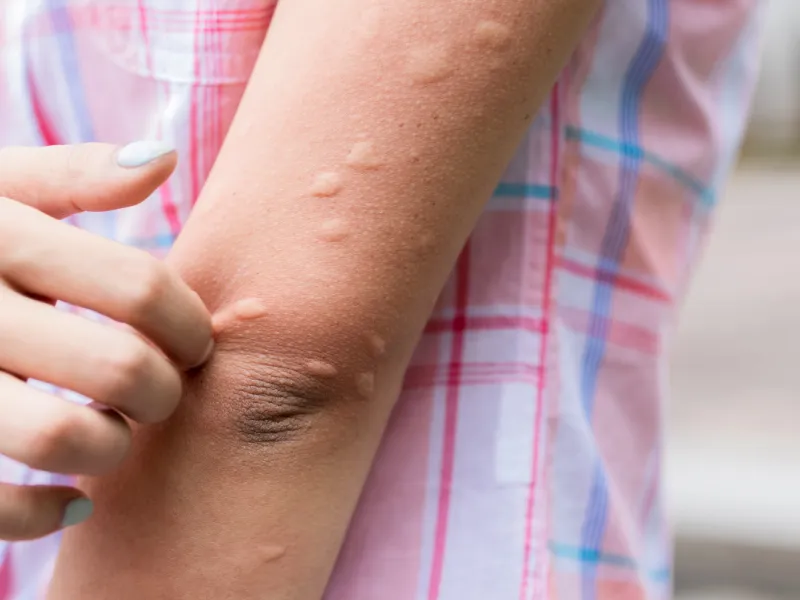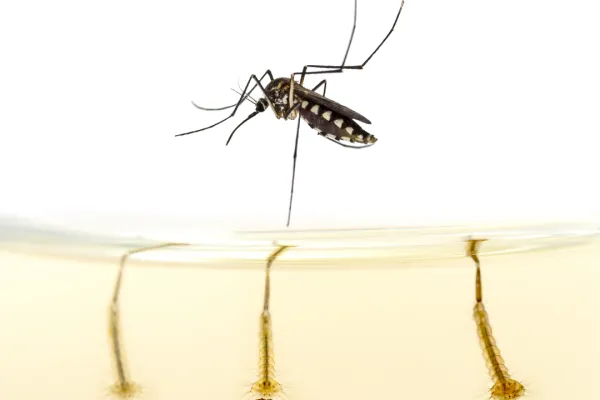Nine Reasons Why Mosquitoes Love You

Nine Reasons Why Mosquitoes Love You
Some people seem to be mosquito magnets, consistently getting far more bites than those around them. Scientists have identified various factors - from the chemicals we emit to the clothes we wear - that explain why mosquitoes find certain individuals especially irresistible. Below, we will summarize nine scientific reasons mosquitoes are attracted to certain people.
1. Carbon Dioxide (Breath)
One of the primary ways mosquitoes locate humans is by detecting carbon dioxide (CO₂) in our breath. Mosquitoes can detect CO₂ from about 100 feet and use it to locate potential hosts. People who exhale more CO₂ over time - for example, due to larger body size or higher metabolic rate - tend to attract more mosquitoes. This helps explain why adults often receive more bites than small children, and why activities that increase respiration, such as exercise, can make you a mosquito magnet. Any condition that boosts CO₂ output, such as pregnancy, also amplifies attraction: pregnant women exhale about 21% more CO₂ than others and have been shown to attract roughly twice as many bites in controlled experiments.
2. Body Odor and Skin Chemistry
Beyond CO₂, mosquitoes hone in on the complex odor signature of a person's skin. Human skin and sweat release over 300 volatile compounds - a chemical cocktail including lactic acid, ammonia, octenol, and other carboxylic acids - many potent mosquito attractants. Mosquitoes use these odors at closer range to differentiate humans from other animals and decide whom to bite. For example, lactic acid (a component of sweat that increases with exercise) was one of the first identified mosquito lures, and ammonia in sweat is another attractant.
Notably, recent research has found that people who are "mosquito magnets" produce significantly higher levels of certain carboxylic acids on their skin compared to those who rarely get bitten. In a 2022 study, individuals who attracted many Aedes aegypti mosquitoes had a unique odor profile enriched in carboxylic acids, fatty acid byproducts of sebum and sweat. These fatty acids alone may not smell "pleasant" - but combined with other odors (like lactic acid and ammonia), they greatly enhance mosquito attraction. In short, the chemical makeup of your body odor significantly determines how tasty you smell to mosquitoes.
3. Skin Microbiome (Bacteria on Skin)
An individual's skin microbiome - the "normal" bacteria living on the skin - plays a pivotal role in creating one's unique scent. Skin bacteria break down components of sweat and sebum into odorous elements that mosquitoes can detect. Interestingly, sweat itself is odorless when freshly secreted; however, when combined with the bacteria on your skin, it produces a more pungent smell and has been shown to attract more mosquitoes than fresh sweat. Differences in the makeup of skin microbes help explain why some people's sweat is more alluring to mosquitoes. A 2011 study found that individuals with higher levels of Staphylococcus bacteria—up to four times more than those with lower levels—emitted odors known to attract mosquitoes.
4. Body Heat and Temperature
Mosquitoes don't just rely on smell—they also use body heat to find their hosts. People who naturally run warmer, whether due to genetics or physical activity, can be more appealing. One study found mosquitoes have a special 'molecular thermostat' in their antennae that detects body heat. When scientists disabled this heat-sensing ability, the mosquitoes were less likely to land on and feed from warm-blooded targets. While mosquitoes can still find us by scent alone, heat provides another reason to bite. This is why exercising—which raises your body temperature and increases sweat—makes you more attractive to mosquitoes. Similarly, the slightly elevated abdominal temperature in pregnant women (about 1.26°F higher on average) may help explain why they tend to get bitten more often.
5. Blood Type
It's often claimed that mosquitoes prefer certain blood types. People with Type O blood get bitten more than those with Type A or B. Some experimental evidence supports this, but it is not as clear-cut as popular wisdom suggests. A well-cited 2004 laboratory study found mosquitoes landed on people with Type O blood nearly twice as often as those with Type A, with Type B falling in between. In that study, about 85% of people were found to secrete signature chemicals through their skin that reveal their blood type, and such "secretors" attracted more mosquitoes than non-secretors, regardless of blood type. Another experiment in 2019, offering mosquitoes samples of all four blood types, also reported a preference for Type O.
6. Genetic Factors and Individual Variation
Beyond blood type, several genetic factors influence your attractiveness to mosquitoes. Researchers estimate that a significant portion of mosquito attraction is inherited. Certain genes have been directly linked to this effect. For instance, the ABCC11 gene, which influences underarm odor and earwax type, can affect the production of specific sweat compounds. One variant of this gene leads to less odorous underarm sweat, potentially making someone less noticeable to mosquitoes. Another key player is the HLA (human leukocyte antigen) gene family, which helps shape your unique body odor. A 2013 study found that individuals with specific HLA variants were particularly attractive to Anopheles gambiae, the primary mosquito species that transmits malaria. These individuals tended to emit higher levels of odor molecules, such as lactic acid and fatty acids, which are known to attract mosquitoes. Genetic differences in skin chemistry, metabolism, and immune response likely account for much variation in how often people are bitten.
7. Clothing Color and Visual Cues
Mosquitoes are not only guided by heat and smell, but visual cues help them zero in on a host once they're in the vicinity. Believe it or not, the color of your clothing can make a difference in how visible or attractive you appear to a mosquito. A recent 2022 experiment by University of Washington scientists tested mosquito responses to different colors. They found that they were drawn to certain hues, such as red, orange, black, and cyan, especially after smelling CO₂. In the same study, mosquitoes ignored colors like green, blue, purple, and white when given a choice. Thus, wearing bright red, orange, or dark clothing might make you easier for mosquitoes to spot, whereas lighter colors that blend into the background make you less enticing to mosquitoes. This doesn't mean color is more important than smell - a mosquito will eventually find you if it's hungry - but clothing color can slightly tip the odds of being noticed sooner versus later.
8. Diet and Foods
What you eat and drink can influence your body's odor profile, though most effects are modest. Despite folk wisdom, garlic or vitamin B supplements do not make you invisible to mosquitoes. On the other hand, some foods might increase your appeal. A 2018 experiment showed that eating bananas led to more mosquito attraction (for Anopheles species), whereas grapes did not. The digestion of bananas may produce skin volatiles that mosquitoes like. Overall, any strongly aromatic food or drink could, in theory, alter your scent. The evidence so far indicates that beer and bananas are two guilty pleasures that can boost bite risk.
9. Infection
Surprisingly, whether you're sick can affect your attractiveness to mosquitoes. Studies have found that people infected with malaria parasites (Plasmodium) become more attractive to mosquitoes than uninfected individuals. Malaria-infected individuals exhale different breath odors, such as more acetone and other compounds, that signal to mosquitoes, "come bite me," thereby increasing the transmission of the parasite. Similarly, viruses like dengue can alter human body odor, making patients more attractive to Aedes mosquitoes that transmit them.
In summary, mosquito attraction is a multifaceted phenomenon: carbon dioxide is the primary cue that draws them in, and body odors (produced by our skin chemistry and microbiome) determine how attractive we smell up close. Body heat and visual cues, such as clothing color, further guide mosquitoes to their preferred targets. Individual factors, such as genetics, influence these signals - for instance, by controlling the odors we emit - which is why some people consistently get swarmed while others escape with few bites. Even behavioral and temporary factors (like drinking beer, exercising, or being pregnant) can tip the scales by altering our odor, heat, or CO₂ emissions. We hope decoding the mosquito's preferences can make us less appetizing to these disease-carrying pests.
Keep you, your family, and pets safe with PestNow's Yard Guard Program that manages mosquitoes, ticks, and fleas around your home.
Frequently Asked Questions:
- Why do mosquitoes bite me more than other people?
Some people naturally attract more mosquitoes due to a combination of body chemistry, skin bacteria, and how much carbon dioxide they exhale. Factors like body heat, sweat, and even genetics can make you more appealing, while others nearby may seem to go untouched.
- Do mosquitoes prefer certain blood types?
- Yes, studies show mosquitoes are more attracted to people with Type O blood than those with Type A or B. About 85% of people also secrete chemical markers that reveal their blood type, which can further influence mosquito preference.
- Does exercise make you more attractive to mosquitoes?
- Absolutely. Physical activity increases both body heat and lactic acid production, two major mosquito attractants. It also boosts your carbon dioxide output, helping mosquitoes detect you from farther away.
- What color clothes should I avoid wearing to keep mosquitoes away?
- Mosquitoes are more attracted to darker and bolder colors like red, orange, black, and cyan. Wearing light-colored clothing such as white, beige, or pastel shades can make you less visible to them.
- Can your body odor attract mosquitoes?
- Yes. Mosquitoes are drawn to specific chemicals in sweat and skin secretions—such as lactic acid, ammonia, and fatty acids. People who produce higher levels of these substances tend to get bitten more often.
Sources:
Smithsonian Magazine - Why Do Mosquitoes Bite Some People More Than Others? smithsonianmag.comsmithsonianmag.comsmithsonianmag.comsmithsonianmag.com
Cell (2022) - De Obaldia et al., Differential mosquito attraction to humans is associated with skin-derived carboxylic acid levels pmc.ncbi.nlm.nih.gov
BMC Microbiology (2022) - Himeidan et al., Skin microbiome alters attractiveness to Anopheles mosquitoes bmcmicrobiol.biomedcentral.combmcmicrobiol.biomedcentral.com
Journal of Medical Entomology (2013) - Verhulst et al., HLA genes influence mosquito attraction pmc.ncbi.nlm.nih.gov
PLOS ONE (2010) - Lefèvre et al., Beer Consumption Increases Human Attractiveness to Malaria Mosquitoes journals.plos.org
Journal of Medical Entomology (2004) - Shirai et al., blood type influences on mosquito landing smithsonianmag.com
Medical and Veterinary Entomology (1993) - Lindsay et al., refuting blood-type effect pmc.ncbi.nlm.nih.gov
Scientific Reports (2015) - Fernandez-Grandon et al., twin study on genetic basis of mosquito attraction pmc.ncbi.nlm.nih.gov
Nature Communications (2022) - Riffell et al., Olfactory gating of visual preferences in mosquitoes (color attraction study) smithsonianmag.com
The Lancet (2000) - Ansell et al., increased mosquito biting of pregnant women (CO₂ and heat effects) smithsonianmag.com


